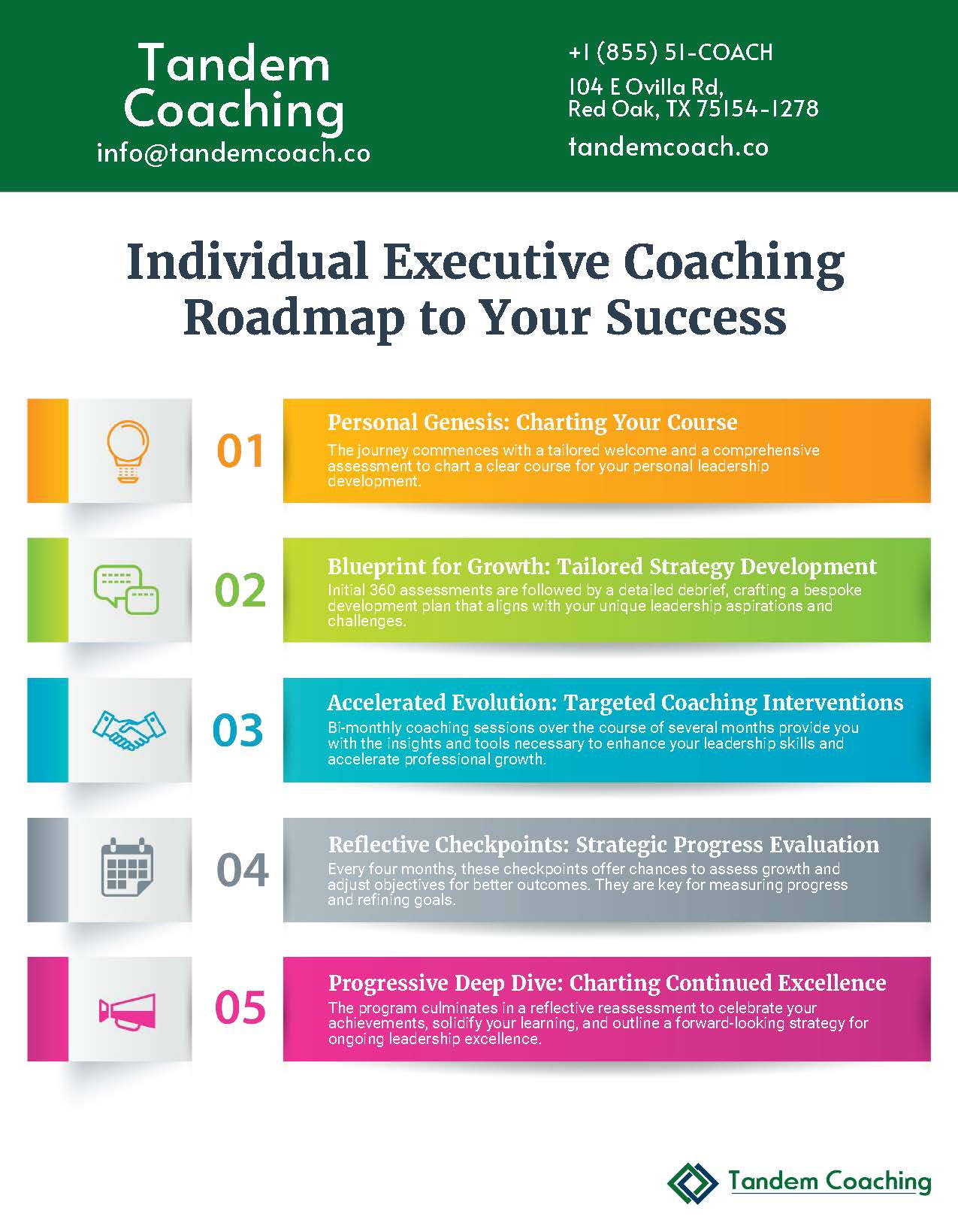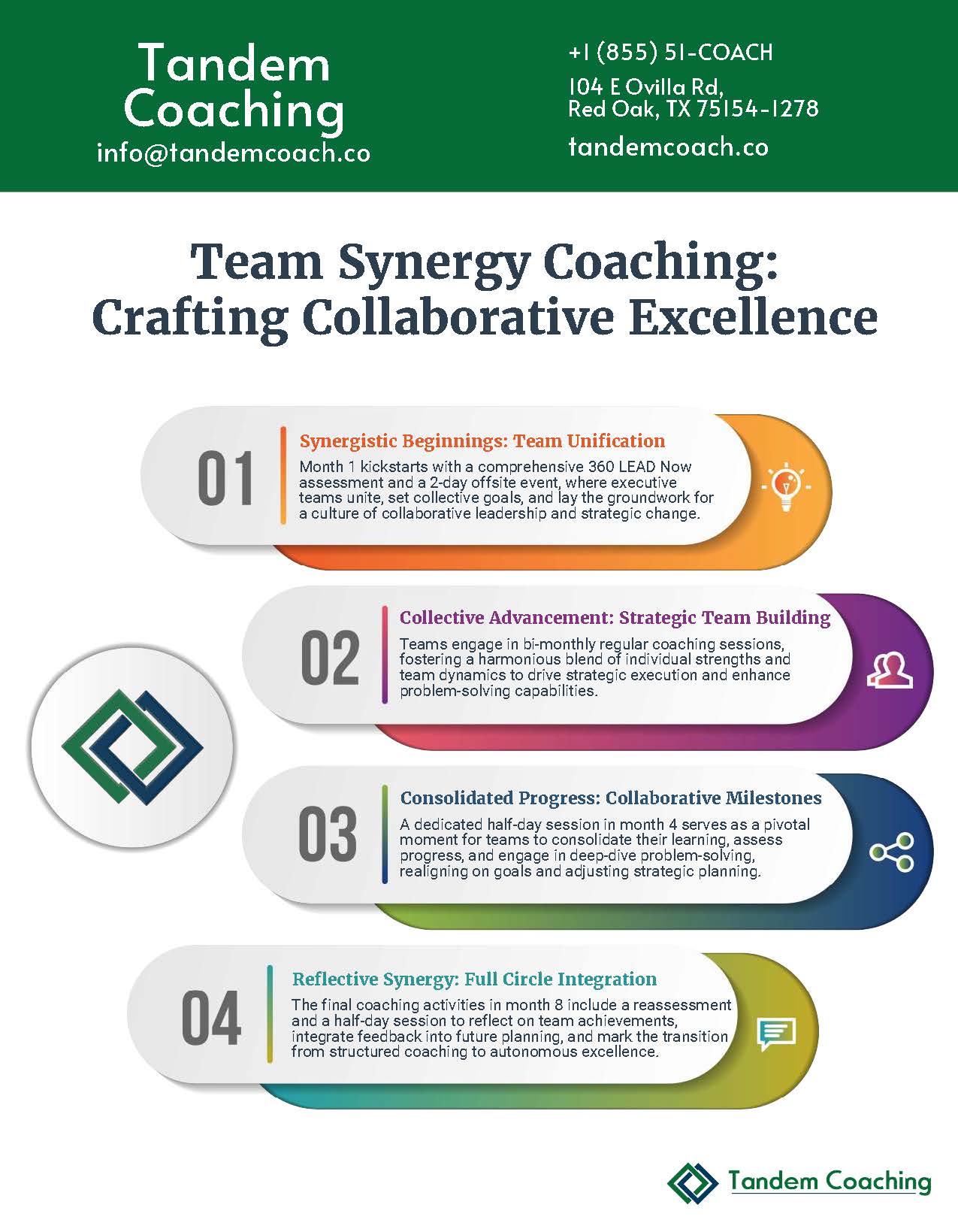Leading a technology-driven organization as a CTO can feel like walking a tightrope. On one side, you’re responsible for the intricate world of technical operations, and on the other, you’re expected to lead with strategic foresight and emotional intelligence. Many CTOs find themselves struggling with the same challenges: their teams aren’t collaborating, project timelines stretch endlessly, and the pressure to deliver results with limited resources never lets up. That’s where executive coaching steps in.
Executive coaching for CTOs and IT leaders provides tailored support, helping tech leaders hone their leadership skills, delegate more effectively, and manage high-performing teams. For example, a CTO may find themselves caught in a bottleneck, making every decision. By working with an executive coach, they can learn how to delegate and empower their team, ultimately speeding up decision-making processes and delivery timelines.
Coaching doesn’t just stop at operational improvements. It helps CTOs build their executive presence, making them more effective when presenting business cases for funding or navigating boardroom conversations. According to research, leadership coaching has been proven to increase leadership effectiveness by fostering transparency, strategic alignment, and decision-making confidence.
This article will walk you through how coaching addresses specific challenges CTOs face, from handling customer complaints to mentoring future tech leaders. Whether you’re looking to enhance team collaboration or develop a robust succession plan, this guide provides concrete steps to help you grow as a leader and drive success in your organization.
What You’ll Discover
- Turn Tech Expertise Into Leadership Mastery: Learn how executive coaching helps CTOs and IT leaders evolve from technical experts to strategic business leaders, enhancing their executive presence and influence.
- Boost Team Collaboration and Delivery Speed: Explore how coaching can unlock better team communication and collaboration, directly improving project delivery timelines and overall efficiency.
- Drive Long-Term Success Through Smart Decisions: Discover how coaching equips technology leaders with the tools to build business cases for funding, manage costs, and future-proof their leadership.
- Build a Leadership Pipeline for the Future: Understand the importance of early succession planning and how executive coaching can help CTOs develop a strong internal pipeline of future leaders.
- Sustain Success with Tandem Coaching: Learn how Tandem Coaching provides tailored coaching solutions, blending tech expertise with leadership development to drive lasting, transformative results.
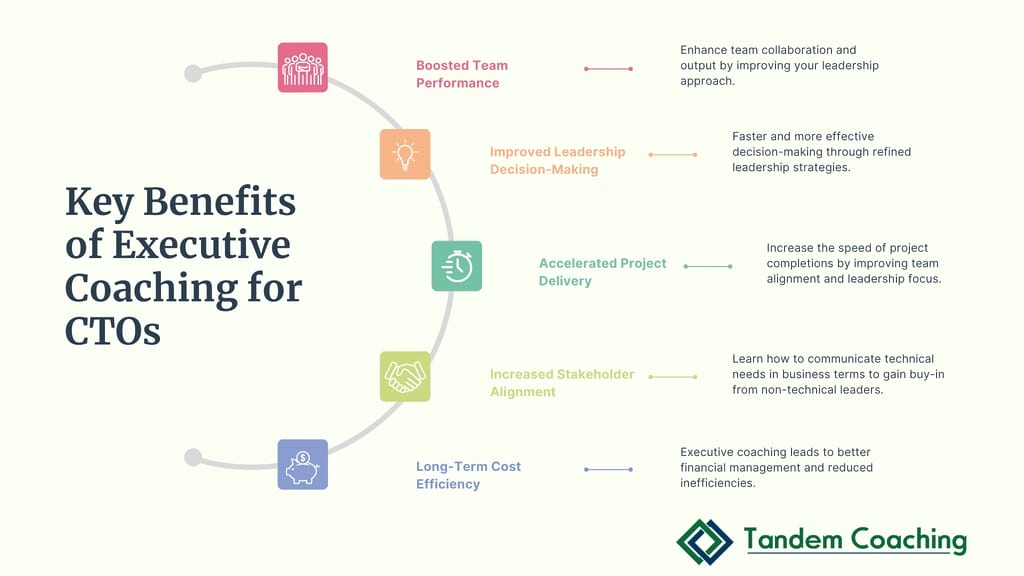
Leadership Development Through Executive Coaching
How Executive Coaching Helps Technology Leaders Excel
As the famous adage by Marshall Goldsmith goes, “What got you here won’t get you there.” Many CTOs reach their positions because of their technical expertise, but excelling in a leadership role requires much more. While staying up-to-date on the latest tech trends remains crucial, the real challenge often lies in developing strong people management and leadership skills.Imagine a CTO who is highly proficient in technical problem-solving but finds that their team is struggling to collaborate effectively. Executive coaching can offer actionable insights and tools to break down communication barriers and build a culture of trust. By enhancing their emotional intelligence and leadership presence, CTOs can foster better team dynamics, leading to a high-performing technical organization.“Leaders become great not because of their power, but because of their ability to empower others.” – John MaxwellCoaching helps CTOs shift from being problem solvers to enablers, giving their teams the autonomy and confidence to execute without micromanagement.
Building Strategic Leadership Skills in CTOs
Leadership at the CTO level requires strategic thinking and the ability to align technology initiatives with broader business goals. This is often where executive coaching makes a significant impact. Through coaching, CTOs learn to balance technical leadership with strategic business alignment, focusing on long-term goals rather than just day-to-day technical challenges.For instance, a CTO who leads large technical teams must not only oversee complex projects but also communicate effectively with non-technical stakeholders like the CEO or board members. Executive coaching equips them with the necessary skills to simplify technical concepts and present them in ways that resonate with broader business objectives.Managing Large Technical Teams with Confidence
As CTOs scale their organizations, managing large teams becomes increasingly complex. Coaching provides the framework for leading teams effectively, delegating responsibilities, and avoiding the pitfalls of becoming a bottleneck. A common struggle among CTOs is the tendency to take on too much, thinking they need to be involved in every decision. Through executive coaching, CTOs learn the art of delegation, empowering their teams while maintaining oversight.This shift in approach not only relieves operational pressure but also fosters leadership growth within the team. As a result, the CTO can focus on higher-level strategies, ensuring alignment between technical and business goals while avoiding burnout.By developing strong leadership skills through coaching, CTOs can evolve from technical experts into strategic leaders capable of guiding their teams and organizations toward long-term success. Executive coaching is one of the most effective tools for facilitating this transformation. It offers CTOs the space and guidance to reflect on their current leadership style, identify growth areas, and develop the necessary skills to lead strategically. Through personalized coaching sessions, CTOs learn how to delegate more effectively, communicate with stakeholders, and align technology initiatives with business objectives, ensuring they drive both technological innovation and organizational success.Enhancing Team Collaboration and Communication
Coaching to Improve Delivery Timelines
One of the most common frustrations for CTOs is that project timelines often stretch far beyond expectations. As organizations grow, managing complex projects with multiple teams can lead to delays, and many CTOs find themselves asking, “Why is delivery taking so long?” While technical roadblocks can be a factor, the root cause often lies in inefficient communication and collaboration within teams.Consider a scenario where a CTO is leading a development team that’s consistently behind on deadlines. Despite the team’s technical proficiency, projects keep getting delayed due to unclear roles and miscommunication across departments. Through executive coaching, the CTO can identify these gaps in communication and learn how to streamline workflows. Coaches often help CTOs break down project management into smaller, actionable tasks, ensuring that every team member is aligned with the project’s goals and timelines.Once these systems are in place, the CTO can foster an environment of accountability, where teams are not only aware of their roles but are motivated to meet deadlines without constant oversight.“Great things in business are never done by one person. They’re done by a team of people.” — Steve JobsBy improving how teams communicate and work together, CTOs can significantly reduce delays and deliver results faster, without sacrificing quality.
Improving Team Collaboration for CTOs Through Coaching
Effective collaboration is at the heart of every successful technical team. Yet, many CTOs struggle to foster a collaborative environment, especially in hybrid or remote settings. When team members work in silos, projects can slow down, and innovation suffers. Improving team collaboration through executive coaching starts with building trust and transparency.A CTO leading a hybrid team might notice that remote members feel disconnected, leading to misalignment in project execution. Through coaching, the CTO can learn how to create communication systems that keep every team member engaged. This might include regular check-ins, transparent goal-setting, or tools that promote real-time collaboration, regardless of location.With these strategies in place, teams start working together more cohesively, leading to faster, more innovative outcomes. Improving team collaboration is not just about tools and processes but also about fostering a culture of openness where every team member feels valued and heard.By addressing collaboration issues head-on, CTOs can not only improve team dynamics but also ensure that project delivery timelines are met consistently.Solving Operational Challenges as a CTO
How to Reduce Costs as a CTO Through Strategic Coaching
For many CTOs, the challenge of balancing innovation with cost management is ever-present. Technology evolves rapidly, but so does the price tag that comes with it. One of the most effective ways CTOs can reduce costs without compromising quality is through strategic coaching. Coaching helps CTOs gain a broader perspective on how to identify inefficiencies, streamline operations, and prioritize investments that yield the highest returns.Consider a CTO overseeing a development project that has ballooned in cost due to over-reliance on external vendors. Through coaching, the CTO could learn how to build in-house capabilities that reduce long-term dependence on costly third-party solutions. By fostering internal talent and aligning technical goals with the broader business strategy, CTOs can find cost-effective alternatives that still support the organization’s growth.Strategic coaching also equips CTOs with the tools to assess their technology stack critically. Are there overlapping services or underutilized software subscriptions draining the budget? Coaching can guide CTOs through the process of auditing their resources, eliminating waste, and ensuring that every dollar spent contributes to the company’s long-term vision.“Cutting costs is about doing things smarter, not cheaper. It’s about creating a system where each part contributes effectively to the whole.”
Managing Pressure and Expectations as a CTO
Another operational challenge that many CTOs face is the pressure to deliver more with limited resources. CEOs and other stakeholders often expect CTOs to push boundaries, deliver faster, and innovate, all while keeping costs in check. Executive coaching provides a structured way to manage these pressures and set realistic expectations.Through coaching, CTOs can develop the soft skills necessary for negotiating with stakeholders and communicating the complexities of technical challenges in a way that non-technical leaders can understand. For example, a CTO feeling the strain of rapid scaling might use coaching to learn how to present a business case for additional resources or time. This allows them to balance organizational demands with the realities of technical execution, ensuring that both sides are aligned on goals and limitations.Coaching also helps CTOs manage internal pressure. Many CTOs are perfectionists by nature, and this can lead to burnout. By learning how to delegate responsibilities and trust their teams, CTOs can reduce their personal workload while empowering their staff to take ownership of critical projects. In doing so, they not only alleviate their stress but also create an environment of accountability and growth within the organization.By addressing these operational challenges, CTOs can focus on leading their teams more effectively, knowing that they have the tools to manage both cost efficiency and stakeholder expectations.Building a Future-Ready CTO Through Coaching
A CTO’s role isn’t just about managing today’s challenges; it’s about setting the organization up for long-term success. This requires thinking beyond immediate needs and focusing on building a sustainable, scalable leadership pipeline, as well as securing the necessary resources for future growth. Executive coaching plays a critical role in preparing CTOs for these future-oriented tasks, from succession planning to pitching for more funding.
Succession Planning for CTOs
Succession planning is not something that can wait until the CTO is about to leave or shift roles. In fact, it should begin almost as soon as the CTO has a firm grasp of the organization’s current projects and priorities. The earlier succession planning starts, the more prepared the organization will be for leadership transitions.
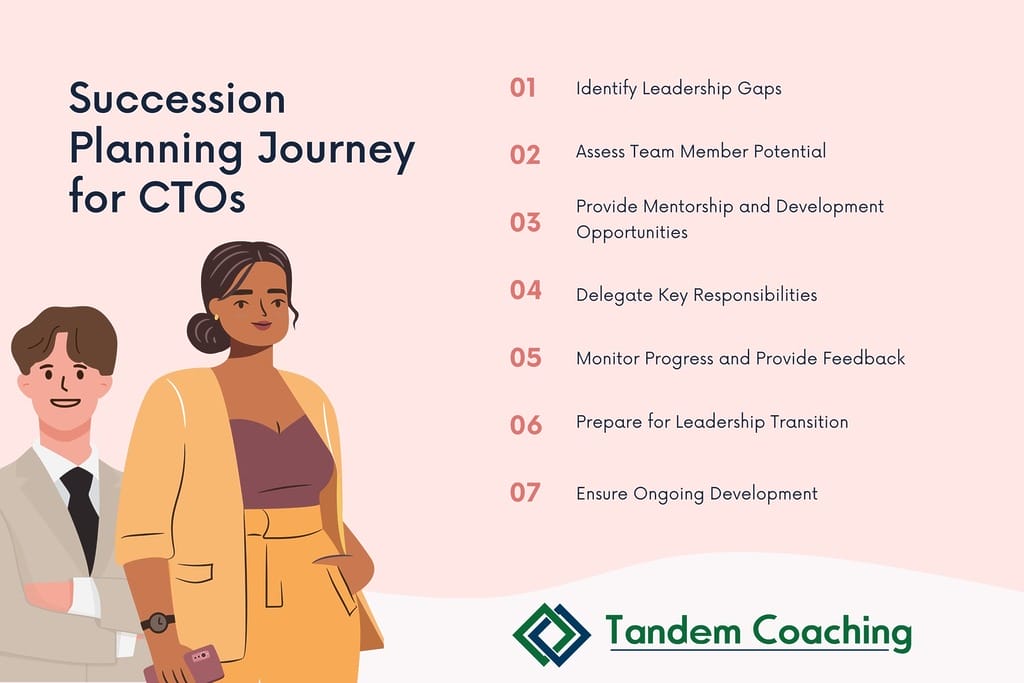
“The best way to predict the future is to create it.” – Peter DruckerBy investing in succession planning early, CTOs can build a robust internal pipeline of leaders ready to take on larger roles, ensuring the long-term stability of the organization.
Building a Business Case for More Funding
As technology evolves, CTOs often need to pitch for additional resources—whether for infrastructure upgrades, adopting new technologies, or expanding teams. However, securing funding from non-technical stakeholders can be challenging. This is where executive coaching proves invaluable.Coaching helps CTOs sharpen their communication skills, particularly when presenting a business case to the CEO or board. The key to success is aligning the request for funding with business objectives. For example, instead of framing a request for a new data analytics platform as a purely technical need, a CTO might demonstrate how the platform will provide actionable insights that drive sales or improve customer retention.Coaches also help CTOs identify the long-term ROI of their proposals, making it easier for them to justify investments. By learning how to present technical initiatives in a way that resonates with business leaders, CTOs can secure the necessary resources to support ongoing innovation and growth.Together, succession planning and securing funding are two pillars of future-proofing any technology-driven organization. Through executive coaching, CTOs can develop the skills needed to ensure both the continuity of leadership and the acquisition of resources for sustained success.Personal Growth and Career Advancement
Developing Executive Presence as a Tech Leader
For a technology leader, technical expertise alone is rarely enough to thrive in an executive role. Developing a strong executive presence is key to gaining influence within the organization and building trust with non-technical stakeholders. Executive presence is about how you carry yourself, how clearly you communicate your ideas, and how effectively you lead others. Leaders who master these skills are better equipped to communicate complex technical concepts in simple terms, secure buy-in for their initiatives, and inspire confidence across all levels of the organization.Many IT leaders begin their journey to improve their executive presence through targeted executive presence coaching. This specialized coaching focuses on body language, vocal tone, and the clarity of message delivery, helping leaders command a room and gain credibility. For instance, a head of technology who feels underprepared when presenting at board meetings might work with a coach to practice presenting their ideas in a concise, impactful manner. This not only builds confidence but also ensures that their proposals are taken seriously.By honing executive presence, technology leaders can influence decision-makers more effectively, gain trust within their teams, and lead their organizations with authority. Through regular coaching sessions, they learn how to navigate high-stakes meetings, address challenging questions, and project confidence even in uncertain situations.“Executive presence isn’t just about how you speak or look—it’s about making others feel confident in your ability to lead.”

Managing Stress and Burnout as a CTO
The fast-paced demands placed on IT executives, combined with the pressure to drive constant innovation, often lead to stress and burnout. Technology leaders are responsible for managing large teams, overseeing complex projects, and meeting high expectations from both their teams and the C-suite. With so much on their plate, it’s no surprise that many IT executives struggle to maintain a healthy work-life balance.
Executive coaching helps IT leaders manage stress by teaching them to prioritize, delegate, and focus on what truly matters. A head of engineering feeling overwhelmed by the constant need to “do more with less” might learn, through coaching, how to set realistic boundaries and delegate tasks more effectively. Coaches also work with leaders to develop coping strategies, such as mindfulness techniques and time management skills, to reduce stress and prevent burnout.
By learning to recognize the early signs of burnout and taking action before it escalates, technology leaders can ensure they remain effective in their roles. Through coaching, they can find a balance between driving technical progress and maintaining their well-being.
Personal growth for a tech leader goes beyond technical mastery. Whether it’s developing executive presence to lead with confidence or managing stress to avoid burnout, coaching provides essential tools for IT leaders to excel in their careers and lead their teams to success.
Conclusion: Driving Long-Term Success with Executive Coaching
The ROI of Executive Coaching for CTOs
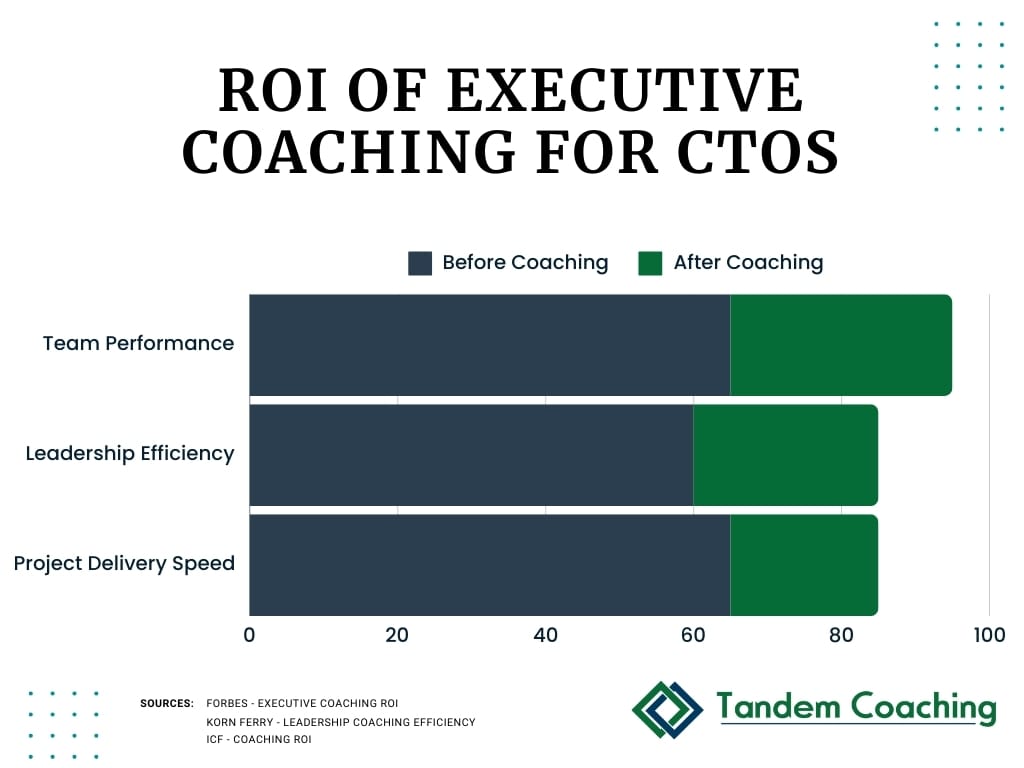
Executive coaching provides a measurable return on investment (ROI) for technology leaders and their organizations. While the financial benefits of coaching are significant—such as improved team efficiency and cost savings from better decision-making—the true value often lies in the less tangible results. For CTOs and IT leaders, the ability to influence at a higher level, drive innovation, and cultivate future leaders within the organization can dramatically shift the long-term trajectory of the company.
When evaluating the ROI of executive coaching, technology leaders can point to improvements in leadership effectiveness, reduced turnover, and enhanced team performance. One CTO might use coaching to sharpen their executive presence, leading to faster buy-in for key initiatives, while another might rely on coaching to enhance team collaboration, resulting in shorter delivery timelines.
At Tandem Coaching, we take ROI seriously. With a proven track record of success, Tandem leverages a depth of experience and expertise that directly addresses the challenges CTOs face in today’s fast-moving tech landscape. Cherie Silas, MCC, is renowned for her ability to mentor executives through transformational changes, with an emphasis on leadership development and emotional intelligence. Her coaching goes beyond surface-level fixes, diving deep into the nuances of leadership that drive real, sustainable change.
Additionally, Alex Kudinov, a tech expert and leadership coach, specializes in helping CTOs bridge the gap between technical expertise and strategic leadership. His global experience across diverse industries allows him to guide technology leaders in navigating the complexities of managing technical teams and aligning with business goals.
The Long-Term Impact on Organizational Performance
The long-term impact of executive coaching can be transformative for both technology leaders and their organizations. Successful CTOs who engage in coaching often report greater alignment between their technical teams and the broader business strategy. By refining leadership skills, these leaders can influence organizational culture, drive innovation, and cultivate a pipeline of future leaders.
A key differentiator at Tandem Coaching is the customized approach we take with each leader. Our coaching is designed not just to solve immediate challenges but to create a lasting, strategic impact that carries the organization forward. By focusing on both the hard and soft skills necessary for leadership success, Tandem helps technology leaders build resilient, high-performing teams and drive innovation.
“Long-term success is not the result of luck or one-time efforts; it’s about creating a system of continuous improvement.”
By investing in executive coaching with Tandem, CTOs can ensure that their leadership not only meets today’s demands but is also poised to guide their organizations through future challenges. With the right guidance and a focus on sustainable leadership development, technology leaders can drive long-term success for both themselves and their teams.
Frequently Asked Questions (FAQs)
What is the role of executive coaching for CTOs and IT leaders?
Executive coaching helps CTOs and other IT leaders transition from purely technical roles to more strategic leadership positions. By focusing on skills like communication, team management, and business alignment, coaching enables tech leaders to influence their organizations effectively. It provides tools for decision-making, delegation, and handling the pressures of high-level leadership, ensuring they can lead teams and deliver on business objectives.
How does executive coaching improve team collaboration?
Coaching helps CTOs address communication gaps and break down silos within their teams. By learning how to foster transparency and trust, technology leaders can encourage more open dialogue, align goals across departments, and create a collaborative culture. This results in better teamwork and smoother project execution, which directly impacts delivery timelines and overall performance.
How can executive coaching help reduce costs in technology-driven organizations?
One of the key benefits of executive coaching is that it equips tech leaders with the skills to manage costs strategically. By auditing current processes, identifying inefficiencies, and delegating effectively, CTOs can make cost-saving decisions without sacrificing quality. Coaching helps leaders focus on long-term, sustainable solutions, like building in-house capabilities rather than relying on expensive external vendors.
What are the benefits of succession planning for CTOs?
Succession planning is crucial for the long-term success of any organization. Executive coaching helps CTOs identify and mentor future leaders within their teams. By delegating responsibilities and providing development opportunities, CTOs can ensure that their successors are well-prepared to step into leadership roles, minimizing disruptions when leadership transitions occur.
How does executive coaching impact delivery speed and project timelines?
Coaching enables tech leaders to optimize team structures, streamline workflows, and set clear expectations, all of which contribute to faster project delivery. By focusing on team collaboration and accountability, executive coaching helps CTOs identify bottlenecks in the process and implement systems to reduce delays, ensuring that projects are completed on time.
What makes Tandem Coaching a good fit for CTOs and IT leaders?
Tandem Coaching offers tailored coaching solutions specifically designed for tech leaders. With a deep understanding of the unique challenges CTOs face, coaches like Cherie Silas and Alex Kudinov blend technical expertise with leadership development, providing actionable insights and long-term strategies for success. Their approach goes beyond short-term fixes, focusing on sustainable growth and transformation.
How does executive coaching help with building a business case for funding?
One of the key challenges CTOs face is securing funding for new technologies and initiatives. Executive coaching teaches technology leaders how to communicate the value of their projects in business terms. By aligning technological investments with business goals, leaders can present a compelling case for why additional resources are necessary, emphasizing the long-term ROI for the organization.
What is the long-term impact of executive coaching on organizational performance?
The long-term impact of executive coaching is often transformative. CTOs who engage in coaching report greater alignment between technical teams and business goals, improved decision-making, and better team dynamics. By building leadership skills, executive presence, and the ability to delegate effectively, coached leaders drive innovation and ensure that their organizations are positioned for sustained success.
Can executive coaching help with stress management for CTOs?
Yes, coaching can significantly improve how CTOs manage stress. By teaching leaders how to set boundaries, prioritize tasks, and delegate effectively, executive coaching helps reduce the burden on tech leaders. Additionally, many coaching programs incorporate mindfulness techniques and stress management strategies, helping CTOs maintain a healthy work-life balance while staying productive.
How does executive coaching support personal growth for technology leaders?
Executive coaching supports personal growth by helping technology leaders expand their skillsets beyond technical expertise. It focuses on developing soft skills such as communication, emotional intelligence, and leadership presence, all of which are essential for success in high-level leadership roles. Through coaching, IT leaders gain the confidence and skills needed to navigate complex organizational challenges and advance their careers.











